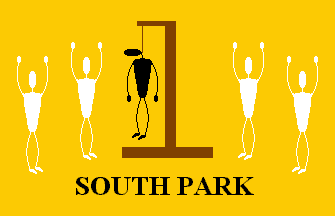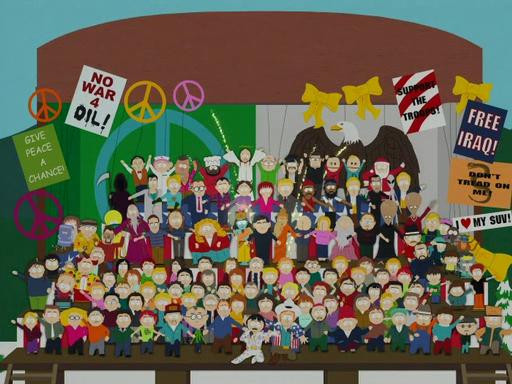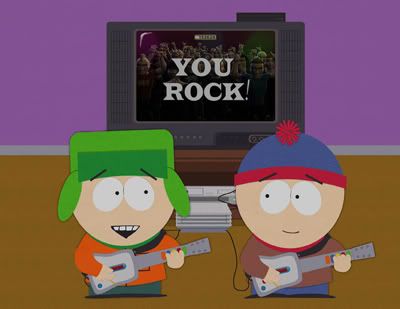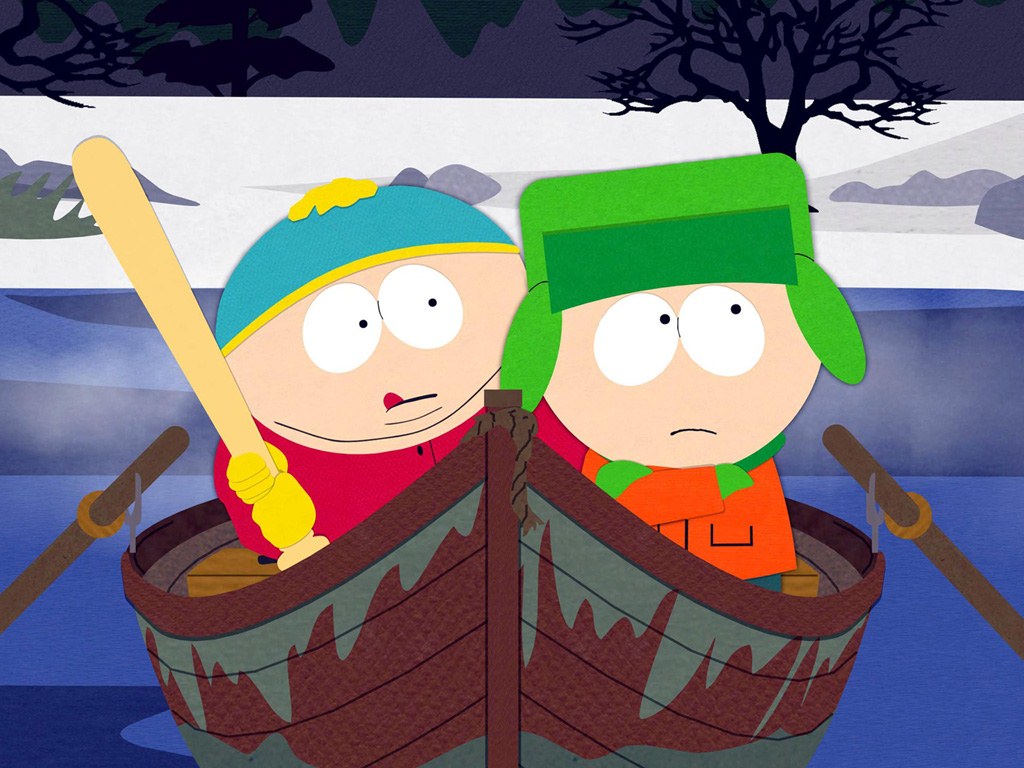
Now in the middle of its 14th season, "South Park" continues to display massive amounts of intelligence and original thought-provoking ideas. An episode that supports the ethics of capitalism? ("Gnomes") An episode that discusses gods existence in relation to karma? ("Cartmanland") An episode that compares chemically altered fast food products to marijuana? ("Medicinal Fried Chicken") An episode that encourages the Boy Scouts of America's right to prevent homosexual scout leaders? ("Cripple Fight") An episode that suggests destroying the rainforest? ("Rainforest Schmainforest")
About 80% of the episodes they have aired ask such questions or make such clearly understood and focused opinions. The rainforest episode points out that the rainforest is the cause of thousands of deaths each year and is the instigator/catalyst for several fatal diseases. In result, it is easy to suggest that humans should not be destroying the rainforest. However, they point out that the rainforest tends to be destroying humans. Obviously their campaign against the rainforest is rather absurd, but they are pointing out some differing views that are hardly shared.

In the episode "Gnomes", the entire town of South Park is on a mission to drive out the new coffee chain, Harbucks. They spend much time discussing the importance of local coffee shops. However, at the very end, the town of South Park decides to try Harbucks coffee and discover that it tastes "much better than the crap" next door. Thus they realize Harbucks became so successful because so many people wanted that particular coffee; because it was good.
Here's a fascinating one. In the episode "Chef Goes Nanners", Chef goes on a passionate pursuit to change the South Park flag (the flag shows four white stick figures hanging one black stick figure, and in case you didn't know, Chef is black). The elementary children are assigned to have a debate on whether the flag should be unchanged due to its historical background and tradition, or if the flag should be altered because of its blatant racism. Stan and Kyle (two of the four main boys) are initially pro-Keep the flag the same, but after taking a closer look they switch sides. When making a public speech on behalf of the Pro-Change the Flag side, they discuss why it should be changed: killing is wrong. They never mention the words "black" or "white" in their speech. Chef then realizes that the children were so "unracist" that they didn't see a difference between black and white at all. Oh how quick we are to declare a label before we declare that we are human.

My point is that the creators of "South Park" initially became popular in its debut for its shocking imagery and language. When the series became more and more popular, Stone and Parker realized that they had an opportunity to truly create an intelligent conversation between themselves and a widespread audience. Thus they took a more intellectual route towards the end of its 2nd season with "Gnomes". Once the film, "South Park: Bigger, Longer and Uncut" premiered, (a film that Stephen Sondheim described as the greatest movie musical since "West Side Story") "South Park" declared itself as a stimulus for the brain and the gut that could not be reckoned with.

"South Park" follows the good folk who reside in the town in which the series is named after. It primarily follows four boys: Stan Marsh, Kyle Broflovski, Eric Cartman, and Kenny McCormick. Kenny is poor, sexually more knowledgeable, and yes, he tends to die every episode (for the first half of the series anyways). Stan is a leader, intelligent, and a romantic. Kyle is Jewish, morally responsible, and the voice of reason (he's become famous for saying, "You know, I learned something today..." at the end of each episode). And then there is Cartman. Cartman is a brilliant, manipulative, and absolutely heartless sociopath of the highest degree. There are also about a hundred other characters that prove to be alarming, hilarious, and fascinating (including and not limited to Mr. Garrison, Butters Stotch, Uncle Jimbo, Wendy Testaburger, Mr. Slave, Token, Craig, Clyde, Bebe, and of course all the parents of the town). There are two two-part episodes that can truly sum up the artistic and humane integrity the show possesses and will continue to.

In season 10's "Cartoon Wars", the series began to identify itself as a show that has humor, and something to say. In the two-part episode, Eric Cartman plans an epic scheme to bring down the show "Family Guy" due to its "poor attempts of being funny without making any sense." Meanwhile, Kyle (the voice of reason) wants to keep "Family Guy" on the air. Kyle argues that it's a funny show and "doesn't get preachy and up its own ass with messages," a habit South Park practices frequently; this episode is no exception. "Family Guy" announces its plan to show an image of Muhammad, the Muslim prophet. Terrorists threaten the country and announce plans of potential retaliation if FOX were to air the episode. Kyle convinces the executives to continue to air the episode. Kyle points out that if this one religious group can't be poked fun at, then soon more and more groups are going to be considered the same, and it will reach the point in which nothing can be shown in a humorous or literal fashion. He says that, "either all of it's okay, or none of it is." That is South Park's credo. Everything is fair game, with a point of view.

NOTE: "South Park" has episodes discussing the nature of when something is appropriate or not appropriate on television. See the episode "Jared Has Aides" or the South Park film. Also, if you're frustrated with the "Everything is fair game" comment, see the episode "The Death Camp of Tolerance," in which tolerance is seen as an enormous threat. As you can see, I love this show.
The other two-parter happened last June, an episode that made minor television history. The series decided to celebrate its 200th episode by bringing back every celebrity they have ever shown on the series since it's inaugural episode, a number well over a hundred. The two episodes (appropriately titled "200" and "201") bring back several famous plotlines the show had endured. The ultimate story line became once more about the prophet "Muhammad" and the ethical nature of showing his image on the show (NOTE: South Park had actually shown an image of Muhammad in 2002. People seem to forget this.) After the first of the two episodes aired, something remarkable happened; Trey Parker and Matt Stone received actual threats from Al-Qaeda terrorists. There was much speculation on whether or not episode "201" would be aired. The episode was premiered, but Comedy Central not only bleeped out the image of Muhammad again, but also bleeped out a lengthy monologue given by Kyle at the end of the episode. At first glance, it felt like a funny joke regarding censorship. But in an interview, Stone and Parker revealed that Kyle's monologue was not meant to be censored; it was a speech about courage and not being intimidated. Stone and Parker stick to what they believe in; either all of it is okay, or none of it is. By the way, they have since caught the man who sent the threats to Comedy Central and the South Park creators and he has been linked to Al-Qaeda. It wasn't a fluke. Hard to blame Comedy Central, but one still can't feel bad for Stone, Parker, and Kyle Broflovski's potentially riveting speech.


South Park gets my salute. Of course there are episodes that make me angry. I don't always agree with what they are saying, but it doesn't mean I disrespect Stone and Parker in any immense degree. While I'm not a fan of "Red Hot Catholic Love" and its poor display of Catholic parishioners, it also works as a two way street. It points out the absolute lunacy of generalizing the Catholic church with pedophilia. I'm also angry by the episode "The Ring" in which they display the Disney corporation as a sexually geared company by using the Jonas Brothers and Miley Cyrus (watching Mickey Mouse swear and beat up children is never enjoyable). But I don't lose respect for Stone and Parker. They're doing what artists should do. They express an idea, I don't agree with it. The conversation has been had, and now I don't watch those episodes any more. Doesn't mean that I can't watch the hundreds of other episodes. It's similar to that of a friend who shares similar ideologies with a few notable differences. You can argue with that friend and disagree with him, but it doesn't mean you're going to cut off the relationship entirely.
There are also images that I can't bear to watch without feeling nauseous (like "Medicinal Fried Chicken", "More Crap", and "Freak Strike") But again, I watch the episodes, understand what they're about, and then I move on.
While South Park is inevitably for the mind, I also can't forget how incredibly hilarious each episode can be. Parodies of famous films, actors, and television series are almost always creative and unique in their own right. "Le Petite Tourette" and "The List" are two of my personal favorites that just lets me laugh uproariously throughout an entire episode.

Nevertheless, South Park proves to be a series that makes me think something new, or a perspective I had never considered. In an episode paralleling the case of Terry Shaivo, Kenny is on life support. His parents want to keep him alive, and Cartman wants him dead so he can inherit Kenny's Playstation. The lawyer carrying Kenny's final will and testament reads "And in the event that I am kept on life support, please for the love of God..." but then he loses the next page. Thus a media storm breaks out with opposing sides arguing the ethical nature of the situation. At the end, the lawyer finds the missing page and completes the sentence. "...please for the love of God, do not show me in that condition on national television." Something I surprisingly never stopped to consider in the midst of the controversy.
Sometimes South Park isn't so subtle with their opinions. They'll make clear judgements without much room for critical thinking. They blatantly declare Scientology to be an enormous sham and unethical corporation. They believe that The Da Vinci Code is an absurd and mentally degrading piece of literature. They point out the incredibly repulsive acts of NAMBLA. That's why South Park is so mentally invigorating for me. It's a different conversation every episode, but always an intelligent one.

Now the series has returned to finish its 14th season. Tonight's episode compared the New Jersey culture that is on public display in series like "Jersey Shore", with that of Al-Qaeda terrorism. For the first time in a while, I was incredibly shocked by an episode with its image of terrorist driven planes (albeit no passengers in them) being used as weapons against the people of New Jersey in an epic battle. But silly of me to lose faith in this show. During the final 5 seconds of the episode, South Park slapped me across the face and basically exclaimed, "If we had to remove either New Jersey or Al-Qaeda, clearly terrorism is a priority." Just another reminder that things on both the top and the bottom of the list are all still on the list nonetheless.
I have no idea why I wanted to go into detail about my admiration, respect, and gratitude towards this series. There's a reason why philosophy professors have written books based on this incredible show. And unlike other outrageous comedy shows, "South Park" actually does have a heart. When Stan and Kyle's friendship pulls through, one can't help feel inspired and compassionate. I strangely... care... about these bizarre, bizarre people. It makes me laugh. It makes me think. It makes me do both simultaneously in a very impactful way. What more could I ask for in a series?
As Kyle always says... "You know, I learned something today..."


No comments:
Post a Comment